The program at one Washington farm school exposes students to the realities of farming, hoping that a new generation of farmers can chart a healthier path in the industry.
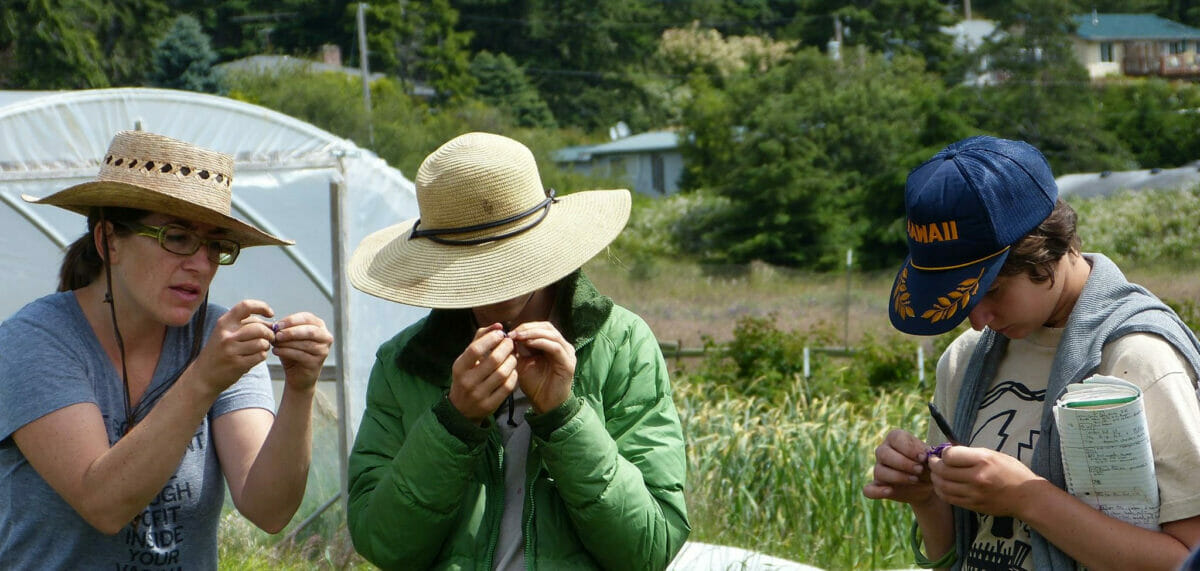
The chilly March rain doesn’t bother Kevin Holton. He traverses the fields, pulling errant weeds and evaluating planting beds for changes alongside the other four students in his cohort. Satisfied with their observations, they make their way across the farm to the sheltered barn room filled with bins full of chunky squash, shelves of books and an expansive communal table strewn with highlighted articles and notepads. But this barn has one other interesting addition—a whiteboard that spans the wall from floor to ceiling. On it, the students plan the week’s seedling trays, transplanting, chicken care, deliveries and staffing for the farm stand.
The program at Organic Farm School (OFS) on Whidbey Island, Washington embraces the notion that we all eat but our food system becomes more broken every year. A rising global population, coupled with volatile commodity prices, high operating costs and the unpredictability of the weather, make farming a tenuous enterprise. In response, OFS readies future farmers to face the challenges that come with that broken system.
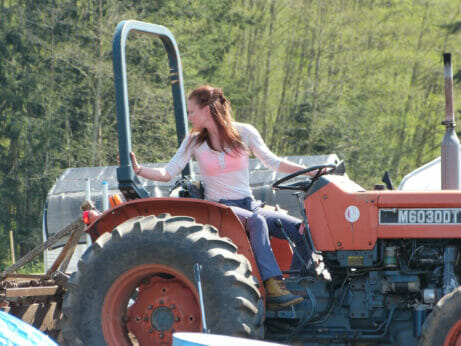
Photography by Judy Feldman.
The secluded Maxwellton Valley location came to the school in a moment of serendipity. On the eve of closing in 2015, Ron and Eva Sher (local philanthropists and owners of several Seattle retail businesses) dedicated a no-fee lease of 10 acres on their 350-acre property for the school’s permanent home.
Students connect with the surrounding community and explore diverse revenue streams through farmers markets, local restaurants, co-ops, grocery stores and a CSA farmstand. They experience all aspects of a working farm on those 10 acres, from decision-making to the minutiae of daily labor through seven-week rotations. They grow 45 different crops including basics such as lettuces, radishes and squash, and more specialty produce such as kohlrabi, beets and sprouting broccoli to sell. They also raise pastured poultry, along with the occasional sheep and pigs. All the revenue produced goes back into the training program to keep tuition affordable and allow students to see the options available when they have their own farm.
The program includes classroom work, field visits, small group work and individual sessions. The goal is to show students the varied tasks of farming as a profession and open up the floor to questions. “I’ve worked on farms previously where you hit the ground running and there’s no time for you to pick your head up,” says Anna Magnuson, assistant farm manager. At OFS, the teaching philosophy is to make space for questions that might come up after students graduate.
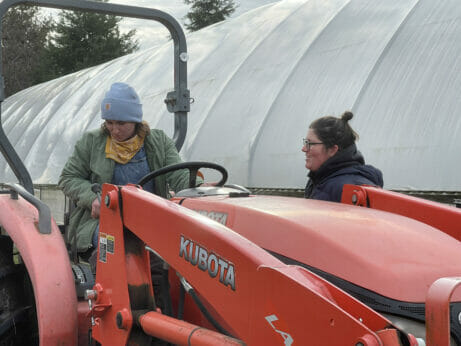
Assistant Farm Manager, Anna Magnuson, talks a new student through the basics of using a tractor. Photography by Judy Feldman.
OFS strives to provide a realistic experience for new farmers. Niceties such as the large walk-in cooler with plenty of sorting bins and dedicated space for both propagation and production in high tunnels and caterpillar tunnels make farming easier, but not all the equipment is top of the line. The lay-flat irrigation rather than buried water lines, Costco tables and a farm-hacked washing machine turned salad spinner represent a version of what a farmer starting out would likely be able to afford. “You have to know plumbing, electrical, crop tending, accounting—a farmer does 15 other professions besides farming, and we want them to go into that with confidence,” says Jeff Markette, farm manager. To that end, students learn how to fix their own tools, because it’s unrealistic to expect someone just starting out to have the money for brand-new gear.
“I got exposure to many basic farming principles, like understanding how to work with different planting dates in a timezone and when certain things need to be started from seed,” says Savannah Reid, former student and Orchard Kitchen head farmer. “I learned how to calculate how much fertilizer [I needed] and how to write and build crop plans. Farming takes quite a bit of math and planning to make it all happen.” Reid now organizes and plans all the produce for Orchard Kitchen’s 3.5-acre farm, farm stand and food hub orders together with the owner and chef.
Taking idealism and rooting it in realism drives the program at OFS. In the weekly field visits, students interact with working farmers around the island, hearing their stories and gleaning advice on techniques and equipment. The supportive community is something Holton hadn’t found in other professions. Asking questions, introducing themselves, making connections and being known for their work are part of the fabric of the program he appreciates.
For Holton, the emphasis on the farmer as an educated person who not only knows about plants but also stays current with publications and research about the changing world is important. “The stereotype of a farmer as an old, uneducated person driving a broken-down truck is not accurate. You’re constantly learning.”
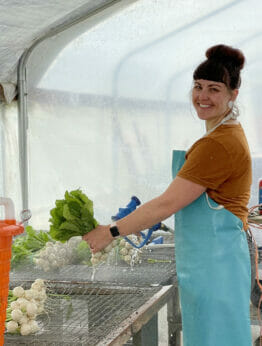
Photography by Judy Feldman.
Even though there’s always something to do on the farm, farming can be an isolating profession. According to the National Rural Health Association, the suicide rate among farmers outpaces that of the general population by 3.5%. Recognizing the gravity of this data, OFS schedules visits from mental health counselors who discuss self-care and suicide prevention, letting the farmers-in-training know there’s no shame in reaching out when they need help. “You hit walls and edges you didn’t know you had. Having somebody listen and then walk them through to the other side is a great template for when they are managing a farm on their own. They realize it’s OK to hit those walls. They can pause and talk it through with someone. Farming is not one day; it’s a lifetime,” says executive director Judy Feldman.
As a lifetime career, it can also be hard on the body. Physical therapists take students into the field to simulate routine activities—such as pulling a tarp—to demonstrate where your shoulder should be and how many times you should change your position so you’re not overworking your hips, back and knees. There’s also a focus on adapting the work as you age. But an aging body is a reality, and OFS helps young farmers see ways to still work the farm as they get older, by taking over less labor-intensive tasks such as seed growing.
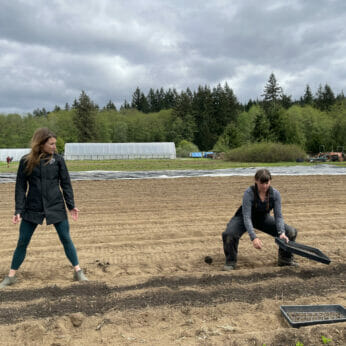
Physical therapists show students how to move their bodies correctly in the field. Photography by Judy Feldman.
Each day on the farm comes with a to-do list with 50 steps. But before a farmer even gets to the field, things have changed and the plan must be amended. “I appreciate that [the instructors] let us fail. They let us get into it and not be afraid of mistakes,” says Holton. “One of the most important things is learning to not be hard on yourself when things don’t go right because things are always gonna go wrong.”
Farming is challenging. “In so many trades, you get thousands of tries to get it right, but in farming, you get one try per season,” says Feldman. “We’re preparing students for real life.”
This program is interesting. I find that today students focus and are taught too much about knowledge in notebooks or theory. Teachers sometimes forget that they also need to learn about practical knowledge that is especially good for their future as well as for society. For example, farming work, planting or harvesting crops.